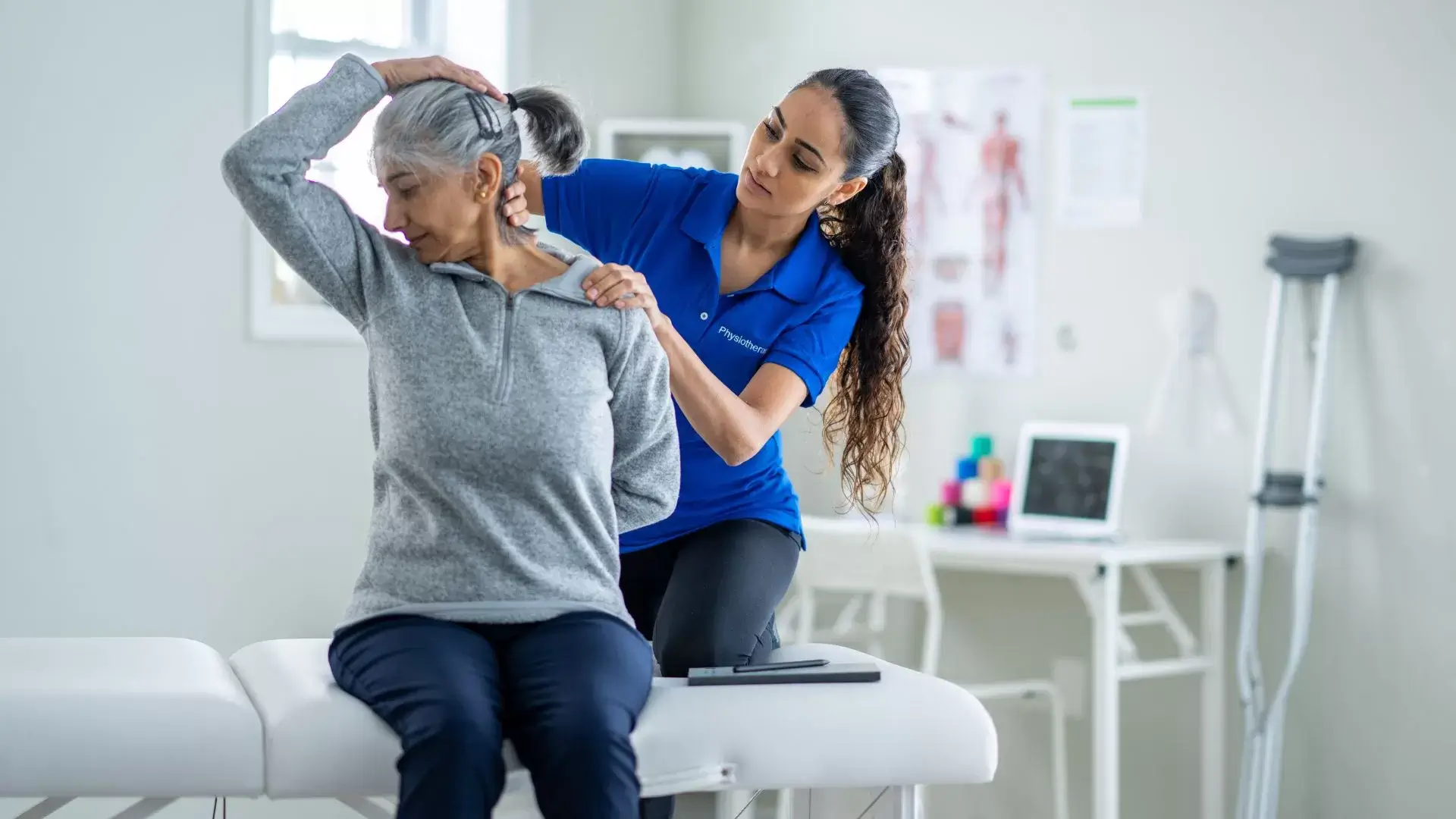At our clinic in Mississauga, we offer specialized physiotherapy for concussion recovery. We recognize how challenging concussions can be, often causing headaches, dizziness, and neck pain. Our Top Physiotherapy & Chiropractic Services in Mississauga targets physical and cognitive impairments, using techniques like manual therapy and vestibular rehabilitation to support your journey back to wellness. We’re committed to tailoring each treatment program to meet your unique needs, ensuring an effective recovery process. Additionally, we emphasize the importance of patient education and long-term strategies to manage symptoms. If you’re interested, there’s much more we can share about how we support concussion recovery.

At Mississauga Physio Chiro Clinic, we offer tailored physiotherapy and chiropractic services designed to support individuals recovering from concussion and optimize their overall well-being. Our approach begins with a thorough spinal assessment, allowing us to identify any misalignments or issues contributing to discomfort.
We emphasize postural correction and pain management, ensuring that our patients understand the importance of postural awareness in their recovery. Through targeted rehabilitation exercises and mobility exercises, we help restore strength and flexibility, facilitating a smoother shift back to daily activities.
Incorporating manual therapy techniques, we address specific areas of tension and discomfort, promoting healing and enhancing mobility. Our team also provides ergonomic adjustments to improve your workspace, reducing strain during everyday tasks.
Recognizing the complexities of concussions is essential, as they can stem from various causes and lead to significant impacts on an individual’s daily life and overall well-being. A concussion often results from a blow to the head or neck, which can also cause spinal misalignment and musculoskeletal dysfunction. These injuries might manifest as neck pain, stiffness, or even back pain, complicating recovery.
In our practice, we focus on the interconnectedness of these issues, understanding that a concussion can create postural imbalances that hinder our patients’ ability to heal. By utilizing physical therapy, we aim to address not only the concussion itself but also any underlying conditions that may be contributing to discomfort.
Our approach includes tailored strengthening exercises and flexibility exercises designed to restore balance and improve function. This thorough strategy allows us to support recovery more effectively, ensuring that we address all aspects of a patient’s health. Together, we can navigate the path to recovery, empowering individuals to regain their strength and return to their daily activities with confidence.
Identifying the signs and symptoms of a concussion is fundamental for timely intervention and effective recovery. We should look out for common indicators such as headaches, dizziness, and confusion following a head injury. Additionally, some individuals may experience upper back pain and muscle tightness, which can complicate recovery. Recognizing these signs allows us to seek appropriate care quickly.
In our practice, we emphasize the importance of integrating physiotherapy into concussion management. This includes spinal manipulation to alleviate discomfort and improve mobility. We also recommend postural therapy and stretching routines to address any musculoskeletal issues stemming from the injury. By focusing on work ergonomics, we can help optimize our daily activities to reduce strain and promote healing.
Furthermore, movement therapy plays a significant role in regaining balance and coordination. It’s essential to tailor these approaches to each individual’s needs, ensuring a holistic recovery process. By staying vigilant about the signs and symptoms of a concussion, we can foster a supportive environment that encourages healing and helps prevent future injuries. Let’s work together to recognize these indicators and take proactive steps toward recovery.
Physiotherapy plays an essential role in concussion rehabilitation by addressing both physical and cognitive impairments to facilitate an extensive recovery. We recognize that the path to recovery can be intimidating, and our approach incorporates a thorough evaluation of each individual’s needs.
Through targeted physiotherapy techniques, we focus on spinal correction and incorporate chiropractic adjustments to restore proper alignment. This can alleviate discomfort and improve overall function. We also emphasize the importance of posture, utilizing posture braces and workplace ergonomics to create a supportive environment for daily activities.
In addition, we offer massage therapy to relieve tension and promote relaxation, which can be crucial in reducing symptoms. Incorporating yoga for posture and core strengthening exercises helps enhance stability and resilience, allowing us to build a strong foundation for recovery.
While anti-inflammatory medication may be necessary in some cases, our holistic approach aims to minimize reliance on it by promoting natural healing through movement and therapy. Together, we can work towards regaining your quality of life, ensuring a well-rounded and effective rehabilitation journey.

Managing post-concussion syndrome and its persistent symptoms requires a thorough approach that addresses both physical and emotional challenges faced by individuals on their recovery journey. We recognize that concussion can lead to a range of persistent symptoms, including headaches, fatigue, and cognitive difficulties. Our goal is to provide a comprehensive rehabilitation program tailored to each patient’s unique needs.
Physiotherapy plays an essential role in this process. We incorporate various techniques such as manual therapy to alleviate pain and improve neck mobility, while exercise therapy helps to gradually reintroduce physical activity, promoting overall well-being. Additionally, neurocognitive therapy assists in addressing cognitive challenges, making sure patients regain their mental clarity.
Patient education is fundamental in empowering individuals to manage their symptoms effectively. We guide our patients through grasping their condition and the importance of pacing activities to avoid exacerbation of symptoms. While vestibular therapy focuses on balance and dizziness, we make certain that our approach is holistic, considering both physical and psychological aspects of post-concussion syndrome. Together, we can navigate this journey towards recovery, fostering resilience and restoring quality of life for those affected.
Vestibular therapy helps us tackle dizziness, balance, and coordination issues that often arise after a concussion, enabling patients to regain their stability and confidence in daily activities. This specialized approach focuses on evaluating and treating vestibular dysfunction, which can greatly impact our overall well-being.
During our sessions, we’ll work on exercises that promote spinal stability and improve postural alignment. These activities are designed to enhance our body mechanics, leading to better coordination and reduced dizziness. Techniques like spinal traction and myofascial release may also be incorporated, addressing any associated shoulder pain or tension that could hinder recovery.
By engaging in vestibular therapy, we can develop strategies to manage our symptoms effectively. This therapy not only helps alleviate immediate concerns related to balance and coordination but also empowers us to face everyday challenges with renewed confidence.
Ultimately, our goal is to restore not just physical stability but also the mental resilience needed to navigate daily life post-concussion. With commitment and guidance, we can make great strides towards achieving a balanced and fulfilling lifestyle.
Addressing post-concussion headaches and neck pain is vital for our recovery, as these symptoms can greatly impact our daily lives and overall well-being. After experiencing a concussion, many of us may develop persistent headaches and neck pain due to spinal instability, poor posture, or forward head posture. These issues can lead to tension in the neck and shoulders, exacerbating our discomfort.
In physiotherapy, we can utilize various techniques to alleviate these symptoms. One effective method is trigger point therapy, which targets specific muscle knots that contribute to our pain. Additionally, our physiotherapist may recommend spinal orthotics to help support proper alignment and reduce strain on our neck.
It’s also important to evaluate our workstation setup, as improper ergonomics can worsen our condition. By making adjustments to our chairs, desks, and computer screens, we can promote better posture and reduce the risk of developing further discomfort.
Through a tailored physiotherapy program that addresses both headaches and neck pain, we can take significant steps toward reclaiming our quality of life and returning to our daily activities with greater ease.
Cognitive rehabilitation is essential for helping us regain memory, focus, and mental clarity after experiencing a concussion. This specialized form of therapy plays a critical role in our recovery, as it targets the cognitive functions that may have been impaired due to the injury. Through tailored cognitive rehabilitation programs, we can work on exercises designed to enhance our memory, improve our focus, and restore our overall brain health.
In conjunction with physiotherapy, cognitive rehabilitation serves as an all-encompassing treatment approach. By addressing both physical and cognitive aspects of recovery, we can experience a more holistic healing process. This therapy involves various techniques, including memory exercises, attention training, and problem-solving tasks, all aimed at rebuilding our cognitive capabilities.
Moreover, the benefits of cognitive rehabilitation extend beyond just the immediate aftermath of a concussion. It helps us develop strategies to manage cognitive challenges that may arise, ensuring we’re better equipped for daily life. By engaging in this therapy, we can greatly enhance our cognitive function, ultimately leading to improved mental clarity and quality of life. Together, we can navigate this journey to recovery with confidence and resilience.

Sleep disruptions and fatigue are common challenges we face after a concussion, greatly impacting our recovery and daily functioning. These symptoms can stem from the brain injury itself, as our bodies work hard to heal. In our journey towards rehabilitation, it’s essential to address these issues to enhance overall well-being.
To combat sleep disruptions, we should prioritize sleep hygiene practices. Creating a consistent bedtime routine, limiting screen time before sleep, and maintaining a comfortable sleep environment can help improve our rest. Additionally, incorporating cognitive rest into our daily routines can reduce mental fatigue. This means allowing ourselves breaks from cognitive tasks, such as reading or using electronic devices.
Physiotherapy can also play an important role in managing fatigue. A physiotherapist can guide us in gentle exercises tailored to our needs, helping to improve our energy levels and overall recovery. By addressing physical and emotional aspects, we can better cope with the fatigue that often accompanies concussions.
As we navigate our recovery from a concussion, it is vital to implement safe return-to-play and return-to-work strategies that prioritize our health and well-being. Engaging in physiotherapy can greatly assist us in developing a tailored recovery plan, focusing on rehabilitation that suits our individual needs.
Initial assessment is important; it helps identify our specific symptoms and limitations. We need to make sure that we allow for adequate cognitive rest before gradually reintroducing physical activity. Starting with light exercises, we can monitor our responses and adjust accordingly, moving towards more intensive activities only as we feel comfortable.
For return-to-work strategies, we should consider our work environment and responsibilities. It may be beneficial to discuss a phased return with our employer, allowing us to gradually increase our workload while remaining mindful of our recovery process.
Ultimately, the goal is to return to our normal activities safely, minimizing the risk of re-injury. By adhering to these safe strategies, we can promote a healthy change back to play and work, guaranteeing that our long-term health remains our top priority.
While we focus on safe return-to-play and return-to-work strategies, it’s equally important to address the emotional changes that often accompany a concussion, including anxiety, irritability, and depression. These emotional shifts can considerably impact our mental health and overall rehabilitation process.
Physiotherapy isn’t just about physical recovery; it also involves recognizing and treating these emotional changes. Our treatment plans can incorporate coping strategies tailored to help manage anxiety and irritability, providing a holistic approach to recovery. Techniques such as mindfulness, relaxation exercises, and cognitive-behavioral strategies may be introduced to promote emotional well-being.
It’s essential for us to acknowledge that experiencing depression after a concussion is common, and we shouldn’t hesitate to seek support. Engaging in open discussions about these feelings is imperative. We can encourage each other to connect with mental health professionals who specialize in concussion-related emotional challenges.
Through a thorough rehabilitation program that includes both physical and emotional support, we can foster a more effective recovery journey. By addressing these emotional changes head-on, we’re not only enhancing our chances of a successful return-to-play and return-to-work but also ensuring we’re mentally prepared for the challenges ahead.
Many individuals recovering from a concussion experience vision-related issues such as light sensitivity, blurred vision, and difficulty focusing, which can greatly hinder their daily activities and overall recovery. In our practice, we recognize how frustrating these symptoms can be, and we emphasize the role of vision therapy as an essential component of concussion rehabilitation.
Vision therapy includes a series of individualized eye exercises designed to improve visual processing and reduce light sensitivity. By targeting focus issues and blurred vision, we can help patients regain their visual clarity and comfort. Our treatment strategies often involve gradual exposure to light and specific activities that enhance eye coordination and focus.
We believe that combining vision therapy with physiotherapy provides a thorough approach to concussion recovery. This dual focus not only addresses physical symptoms but also enhances cognitive function, helping individuals return to their daily routines more effectively. We encourage our patients to be proactive in their rehabilitation journey, as consistent practice of the prescribed exercises can lead to significant improvements. By working together, we can navigate these challenges and help restore visual function, ultimately supporting a smoother recovery from concussion.
Implementing ergonomic and workplace adjustments is essential for individuals recovering from a concussion, as these modifications can greatly enhance comfort and support a smoother return to daily activities. It is understood that improper posture can exacerbate symptoms, leading to spinal curvature issues, such as postural kyphosis, and even thoracic pain. As a result, creating a workspace that encourages proper alignment is critical.
For instance, adjusting chair height and ensuring the computer screen is at eye level can prevent slouching and reduce the risk of developing text neck. We should also consider incorporating ergonomic adjustments, like supportive chairs and keyboard placement, to minimize strain on the body. These workplace adjustments can considerably aid in concussion recovery by facilitating a healthier posture and reducing discomfort.
Moreover, addressing any pre-existing conditions, such as degenerative disc disease or spinal deformity, is important during this process. We must encourage individuals to take frequent breaks and engage in gentle stretches to alleviate tension and promote overall well-being. By prioritizing these adjustments, we can create a supportive environment that fosters healing and enhances the recovery journey for those affected by concussion.
As we create supportive environments through ergonomic adjustments, it’s equally important to contemplate how nutrition and hydration play an essential role in optimizing brain health during concussion recovery. A well-balanced diet rich in necessary nutrients not only supports our overall wellness but also enhances cognitive function, which can be particularly beneficial in the healing process.
Incorporating foods high in omega-3 fatty acids, antioxidants, and vitamins can boost neuroplasticity, helping the brain adapt and recover more effectively. Alongside nutrition, hydration is fundamental. Dehydration can lead to fatigue, headaches, and impaired cognitive performance, all of which can hinder our recovery efforts.
Implementing effective hydration strategies, such as regularly sipping water throughout the day or consuming hydrating foods, can greatly impact our brain health. By prioritizing both nutrition and hydration, we can create a robust foundation for our recovery and physical therapy sessions.
Establishing effective long-term recovery strategies is fundamental for not only healing from a concussion but also for minimizing the risk of future injuries. In our journey through concussion recovery, we must incorporate thorough physiotherapy treatment that focuses on rehabilitation exercises tailored to our individual needs. This often includes vestibular therapy, which helps address balance issues, and cognitive rest, allowing our brains to recuperate properly.
As we progress, it’s important to follow physical activity progression guidelines, ensuring we safely regain our strength and endurance. Adhering to return to play protocols is essential, especially for athletes, as it provides a structured path back to sports while minimizing the risk of re-injury.
Patient education plays a key role in this process. By understanding the symptoms, risk factors, and necessary precautions, we empower ourselves to make informed decisions about our health. Implementing these long-term strategies not only aids in recovery but also fosters a proactive approach to preventing future injuries. By committing to these practices, we can safeguard our well-being and enhance our overall quality of life.
If we’re seeking expert guidance for concussion recovery, scheduling a consultation for specialized physiotherapy in Mississauga can be an essential step towards regaining our health and well-being. Engaging in concussion physiotherapy provides us with tailored rehabilitation strategies that address the unique challenges we face, including symptoms related to post-concussion syndrome.
During our expert consultation, a thorough neurological assessment will help identify the specific symptoms and limitations we’re experiencing. Based on this evaluation, our physiotherapist will develop a personalized physical therapy plan that may include manual therapy techniques and targeted exercises aimed at symptom management and improving our overall function.
Moreover, if we’re athletes recovering from a sports injury, this specialized approach guarantees we receive the support needed to safely return to our activities. The combination of expert guidance, focused rehabilitation, and symptom management techniques can greatly enhance our recovery process. Contact us now!
Mississauga, a vibrant city in Ontario, boasts a diverse community and a rich array of amenities that enhance our quality of life. As residents, we enjoy access to numerous healthcare services, including physiotherapy clinics specializing in concussion treatment and rehabilitation. Our city recognizes the importance of wellness programs designed to support individuals recovering from sports injuries and other health challenges.
With a strong focus on community resources, Mississauga fosters an environment where residents can find the support they need for ideal recovery. We benefit from a network of skilled physiotherapists who are dedicated to helping us regain our strength and mobility after experiencing a concussion. This expertise is essential, as concussion symptoms can vary greatly, requiring tailored treatment plans to address specific needs.
In addition to individual care, our city emphasizes the importance of preventative measures and educational initiatives that empower us to stay informed about sports injuries and their management. By leveraging the various physiotherapy and healthcare services available in Mississauga, we can actively participate in our recovery journey and promote overall wellness within our community. Together, we can guarantee that we’re well-equipped to handle the challenges of concussion and other health concerns.

When we think about physiotherapy treatment for concussion, it typically lasts anywhere from a few weeks to several months, depending on the individual’s recovery progress. We’ve noticed that treatment duration can vary based on factors like the severity of the concussion and the patient’s response to therapy. It’s essential for us to stay patient and committed to the process, as everyone heals at their own pace, and consistent support is vital for effective recovery.
When considering whether physiotherapy is effective for all concussion patients, we must acknowledge that individual responses can vary widely. While many patients experience significant improvements through tailored physiotherapy, others may not respond as favorably. Factors such as the severity of the concussion, the patient’s overall health, and adherence to treatment all play vital roles. It’s essential for us to work closely with healthcare professionals to create personalized rehabilitation plans for the best outcomes.
When considering insurance coverage for physiotherapy related to concussion rehabilitation, we should check with our individual insurance providers. Many plans do offer some level of coverage, but it varies widely. It’s essential to understand our policy details, including any required referrals or pre-approvals. By doing this, we can guarantee we’re making the most of our benefits while receiving the necessary care for our recovery. Let’s advocate for our health together.
We believe physiotherapy can greatly aid in emotional recovery after a concussion. The therapeutic process not only addresses physical symptoms but also supports mental well-being by providing coping strategies and emotional support. Through targeted exercises and education, we can help individuals regain confidence and reduce anxiety, fostering a more holistic recovery. It’s crucial to recognize that emotional health is just as important as physical health during the healing journey.
When we go to our first physiotherapy appointment for a concussion, we should bring a few essential items. It’s helpful to have any medical records or referral letters from our doctor, a list of medications we’re taking, and a notepad to jot down questions. Wearing comfortable clothing is also important, as it allows for easier movement during assessments. Finally, we should bring an open mind, ready to discuss our symptoms and recovery goals.
Reach out to us today to book an appointment or learn more about our services. Our friendly team is here to answer your questions and help you take the first step toward improved health and wellness.
(647) 372-1209

At our “Mississauga Physio Chiro Clinic”, we are dedicated to providing personalized care that addresses the root cause of your discomfort. With a team of experienced physiotherapists and chiropractors, we focus on restoring your mobility, relieving pain, and enhancing your overall well-being.